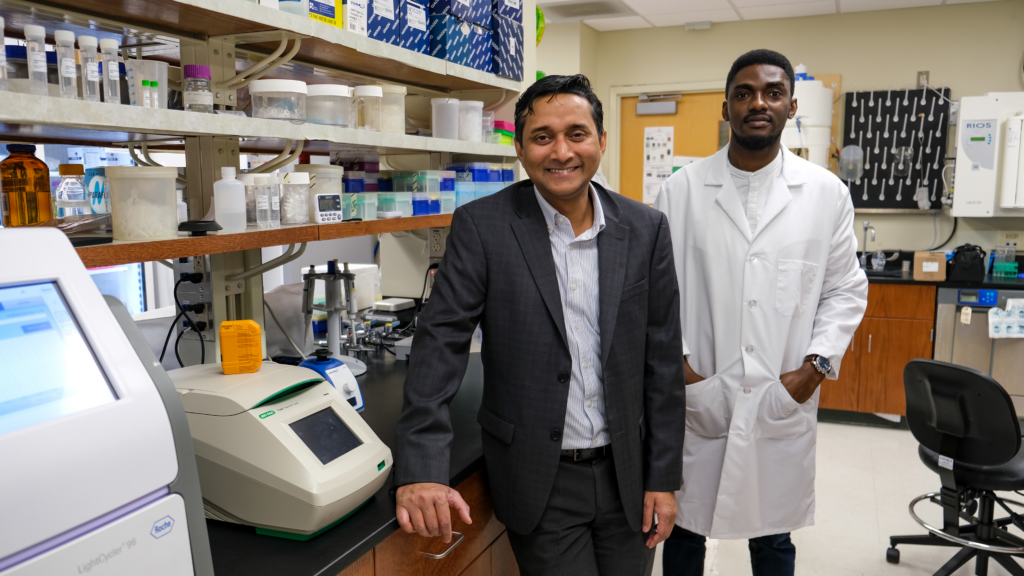Diners with discerning tastes may be keen to order an entrée featuring shrimp harvested from the waters of the Atlantic. Or perhaps they prefer a Pacific crustacean.
But restaurant-goers beware: As the most consumed and highest imported seafood in the U.S., shrimp are vulnerable to food fraud, species substitution and mislabeling.
To help combat the issue, researchers within Florida State University’s College of Health and Human Sciences collaborated with seafood industry representatives to develop a quick and cost-effective authenticity test to identify Atlantic white shrimp.
Assistant Professors Prashant Singh and Leqi Cui, and graduate students Samuel Kwawukume and Frank Velez from the Department of Nutrition & Integrative Physiology detail the process in a paper published in Food Chemistry: Molecular Sciences.
“Looking at the industry, there’s not much time for laboratory testing, but there’s always a need for rapid tests,” said Kwawukume, a master’s student who spent five years working as a food scientist prior to joining the Singh lab.
Species identification is typically a five-day process that involves shipping samples overnight to a testing lab for extensive DNA extraction and analysis. The new test developed by the FSU team can generate results on-site at restaurants, markets, and other facilities in as little as two hours.
Even though species substitution is against Food and Drug Administration (FDA) regulations and federal law, shrimp substitution rates as high as 30% or more have been reported.
“As you move to bigger cities, the number increases,” said Singh, whose lab has been conducting shrimp species identification testing for seafood industry representatives over the past two years. “Wholesalers are selling the right products, but as you move to restaurants and smaller markets, that’s where a lot of the challenge is.”

Atlantic white shrimp are one of the most economically valuable shrimp species in the southern U.S., making them particularly prone to substitution. They are harvested from North Carolina to Florida and along the Gulf of Mexico. With such high demand, less expensive imported shrimp species have been used to substitute Atlantic white shrimp – such as Pacific white shrimp.
Typically, seafood experts can identify shrimp species based on physical characteristics. However, with processing, shrimp are often peeled and deveined, making identification challenging.
“When you peel the shrimp, they look similar,” Singh said. “That’s why industry wants a method they can use at their location without the use of any advanced equipment to confirm the species. They don’t have resources for a fancy lab or expensive equipment, they don’t want to send off samples and wait five days for results, which can be an expensive process for them too.”
Proper identification and marketing of shrimp species is important for consumer safety.
“Each species has different allergens, so if you substitute, you could introduce allergens,” said Kwawukume. “It also has an economic importance because Atlantic shrimp is very expensive compared to many other species, and in the case of substitution, the consumer isn’t getting the value they paid for.”
The new authenticity test involves the use of a lateral flow strip – or test strip – and a handheld PCR device to extract a DNA sample from the shrimp. When a test strip is placed into the DNA sample solution, it produces a band on the strip confirming the presence of a gene specific to Atlantic white shrimp, indicating a positive result.
The test can detect the species in both raw and cooked samples.
The research team is hopeful the test will be adopted and successful within the seafood industry. Meanwhile, they are working to develop authenticity tests for other seafood such as red snapper and fish species prone to substitution.
David Williams of SeaD Consulting also contributed to the study. The research and development was supported by Florida State University startup funds awarded to Singh.
Hear more from Williams, Singh and Kwawukume in an interview with FSU Headlines.
This article originally appeared on news.fsu.edu.
